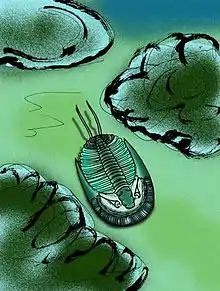Entomaspis
Entomaspis is an extinct genus of harpetid trilobite from Upper Cambrian to Early Ordovician marine strata of the United States. Species are typified by their proportionally large, vaulted, croissant-shaped or bonnet-shaped cephalons that have the cheeks freed to become elongated, curved librigenial spines, and by their comparatively large, crescent-shaped eyes (in comparison with other eyed harpetids).
| Entomaspis Temporal range: Upper Cambrian-Earliest Ordovician | |
|---|---|
 | |
| E. radiata | |
| Scientific classification | |
| Kingdom: | Animalia |
| Phylum: | Arthropoda |
| Class: | †Trilobita |
| Order: | †Harpetida |
| Family: | †Entomaspididae |
| Genus: | †Entomaspis Ulrich, 1931 |
| Type species | |
| Entomaspis radiata Ulrich, 1931 | |
| Species | |
| |
Species
E. bridgei
E. bridgei is a species found in marine strata of Missouri.
E. radiata
E. radiata is the type species, and is found in Uppermost Cambrian and Lowermost Ordovician marine strata of Utah. It coexisted sympatrically with E. rawi.
E. rawi
E. rawi was originally described as Hypothetica rawi, and coexisted with E. radiata in Lowermost Ordovician marine strata of Utah.[2]
References
- Shaw, Alan B. "Paleontology of Northwestern Vermont. XII. Fossils from the Ordovician Highgate Formation." Journal of Paleontology (1966): 1312-1330.
- Moore, R.C. (1959). Arthropoda I - Arthropoda General Features, Proarthropoda, Euarthropoda General Features, Trilobitomorpha. Treatise on Invertebrate Paleontology. Part O. Boulder, Colorado/Lawrence, Kansas: Geological Society of America/University of Kansas Press. pp. 1–560, 419. ISBN 0-8137-3015-5.